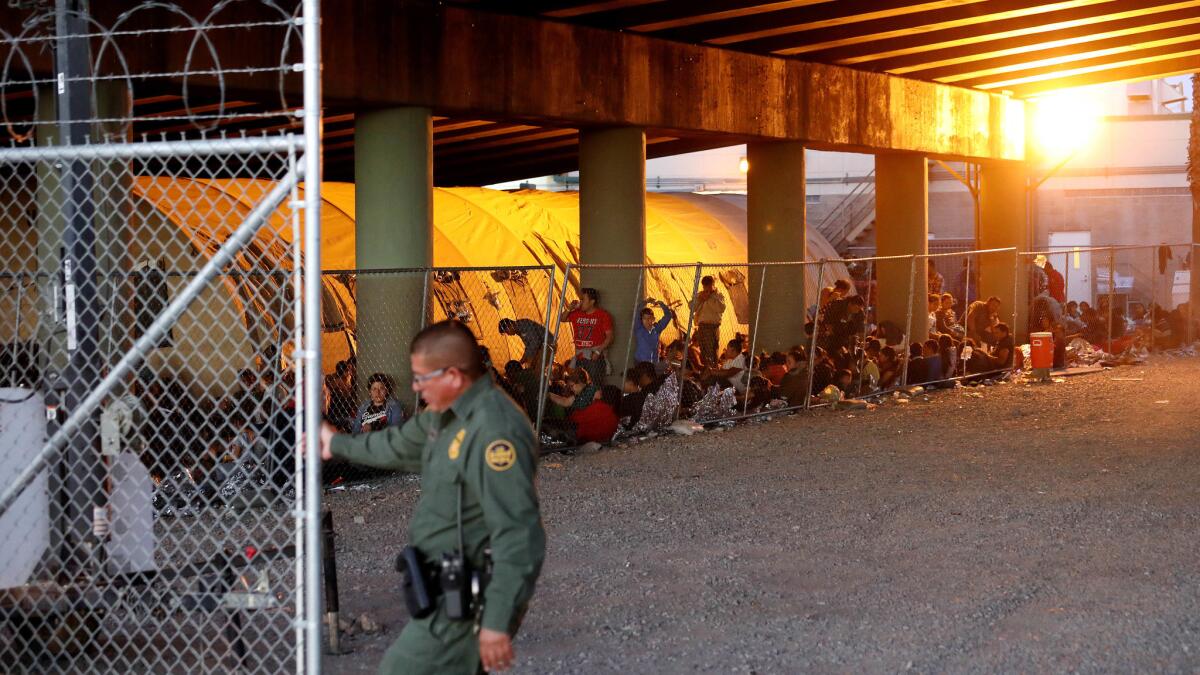Yet again, Trump ignores the law to impose his will on America’s neighbors

- Share via
Less than two years ago, President Trump sought to end the moratorium President Obama had placed on deporting “Dreamers,” calling it an abuse of presidential authority and “an end-run around Congress” that violated “the core tenets that sustain our Republic.”
Apparently, Trump has changed his mind about the limits of presidential power when it comes to immigration, because he’s been using his with a vengeance — not to aid the vulnerable, but to reduce the flow of desperate people across the southern border. According to the Migration Policy Center, the Trump administration has made some 600 unilateral changes in immigration policy, the most of any presidency in modern times. These include such major steps as returning migrants to Mexico if they cross the southern border illegally, barring asylum requests from migrants who enter the U.S. from anywhere other than a legal point of entry, and threatening to slap increasingly high tariffs on Mexican goods unless the country stops migrants from making their way north to the United States.
This week, though, the president outdid himself, all but ending asylum for anyone from Central America or other points south of Mexico. Under a new rule that went into effect Tuesday, migrants fleeing persecution and violence will have to ask for asylum from the countries they pass through before reaching the United States, with limited exceptions. If they do not, the administration will seek to send them back to their home countries, even if it means sending them right into the arms of the gangs or abusers they were trying to escape.
It boggles the mind to think of families fleeing MS-13 recruiters, drug traffickers and extortionists in Honduras or El Salvador trying to resettle safely in dysfunctional Guatemala. Even the idea that Mexico, which has its own problems with homicidal cartels, is a haven for asylum seekers strains credulity.
The administration justified the move by saying the new system would “reduce the overwhelming burdens on our domestic system caused by asylum seekers failing to seek urgent protection in the first available country, economic migrants lacking a legitimate fear of persecution, and the transnational criminal organizations, traffickers, and smugglers exploiting our system for profits.”
In fact, though, the new rule is not only cruel, it is a retreat from the United States’ moral obligation and long-standing commitment to helping those who seek refuge here.
Certainly, there’s an immigration problem that needs to be solved. The system has been overwhelmed by the uptick in migrant families arriving at the border; the backlog of cases in federal immigration courts is so severe that the average wait to have one’s status resolved is well over two years.
But for the umpteenth time in Trump’s presidency, the administration is ignoring federal law in an effort to circumvent Congress and to impose its will on America’s neighbors. The Immigration and Nationality Act unequivocally allows asylum seekers to come from anywhere and present themselves at any point along the border, not just at manned checkpoints. The main exception is for migrants coming from countries that have a “safe country” agreement with the United States, which Canada does but Mexico and other nations to the south do not.
Legal experts say that the administration will allow asylum seekers to apply for a reprieve from deportation before sending them back to their home countries, but it has set such a high bar for qualifying that few are likely to succeed. In that respect, the new rule is not only cruel, it may violate the international agreements that bar the United States from sending refugees and asylum seekers back into persecution.
This country’s prosperity makes it a magnet for migrants, many of whom may have no legal right to immigrate. But many of them are fleeing desperate situations in search of asylum, and Congress established a humane process for receiving them and judging their pleas that the administration cannot flout.
More to Read
A cure for the common opinion
Get thought-provoking perspectives with our weekly newsletter.
You may occasionally receive promotional content from the Los Angeles Times.









